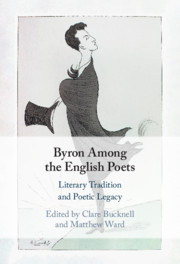Book contents
- Byron Among the English Poets
- Byron Among the English Poets
- Copyright page
- Dedication
- Contents
- Contributors
- Acknowledgements
- Abbreviations
- Introduction
- Part I Inheritances
- Chapter 1 Byron and Shakespeare
- Chapter 2 Not for Envy: Paradise Lost and the Inward Turn in Byron’s Cain
- Chapter 3 Byron and Rochester
- Chapter 4 Byron’s ‘Popifying’: Twice-Told Tales
- Chapter 5 ‘Liquid Lines’: Byron Among the Amatory Poets
- Chapter 6 Byron and Satire post-1760
- Chapter 7 Byron’s English Verse Inheritance
- Part II Contemporaries
- Part III Afterlives
- Index
Chapter 6 - Byron and Satire post-1760
from Part I - Inheritances
Published online by Cambridge University Press: 22 July 2021
- Byron Among the English Poets
- Byron Among the English Poets
- Copyright page
- Dedication
- Contents
- Contributors
- Acknowledgements
- Abbreviations
- Introduction
- Part I Inheritances
- Chapter 1 Byron and Shakespeare
- Chapter 2 Not for Envy: Paradise Lost and the Inward Turn in Byron’s Cain
- Chapter 3 Byron and Rochester
- Chapter 4 Byron’s ‘Popifying’: Twice-Told Tales
- Chapter 5 ‘Liquid Lines’: Byron Among the Amatory Poets
- Chapter 6 Byron and Satire post-1760
- Chapter 7 Byron’s English Verse Inheritance
- Part II Contemporaries
- Part III Afterlives
- Index
Summary
English Bards and Scotch Reviewers (1809), Byron’s vicious early satire on the contemporary literary scene, started life as ‘British Bards’, a shorter piece of about 500 lines focussed predominantly on ‘the poetry of the present Day’.1 When Byron first tried to publish it in December 1807 his bookseller refused, on the grounds that it contained ‘if not gunpowder, at least half a dozen libels’.2 As a would-be satiric debut, ‘British Bards’ was certainly combustible and very confident. But a large part of its assurance came from the authority of the company it joined. In its approach and in some of the particulars of its critique, it sought to continue the work of a number of recent heroic couplet satires on literary subjects: Richard Mant’s The Simpliciad (1808), Lady Anne Hamilton’s Epics of the Ton (1807), and – in the previous century – William Gifford’s influential Baviad (1791) and Maeviad (1795) and T. J. Mathias’s Pursuits of Literature (1794–97). Each of these satires attacks a group of upstart poets who are trying to do something new: in Mant, Hamilton and Byron’s cases, the Lake Poets and various minor poets associated with their group; in Gifford’s poem a decade earlier, the Della Cruscan poets grouped around Robert Merry, Hannah Cowley and Mary Robinson; and in Mathias’s case, the Della Cruscans in company with almost anyone else who dared to lift a pen. Each satirist shoulders the responsibility of protecting and speaking for the established neoclassical tradition they see themselves as belonging to, and which they believe to be under siege.
- Type
- Chapter
- Information
- Byron Among the English PoetsLiterary Tradition and Poetic Legacy, pp. 100 - 113Publisher: Cambridge University PressPrint publication year: 2021



